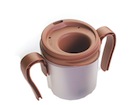Blog Archives
Swallowing Disorders, Dysphagia – Do Drinking Aids Help?
Swallowing is simple, right? Take a drink and it goes down automatically, or so you think. But, it is actually a complex process that requires several levels of the central and peripheral
nervous system to cooperate. If a person has had a stroke, the throat may be affected and they only be able to take small sips without choking. When you eat or drink the substance goes down the esophagus to the stomach, if you swallow “wrong” it may go down the trachea into the lungs causing aspiration pneumonia, a dangerous situation.
Swallowing difficulties, also called Dysphagia may be caused by several medical conditions including stroke, Alzheimer’s Disease, Parkinson’s Disease, Cerebral Palsy, ALS and after chemotherapy. Research indicates that Dysphagia has been underestimated in neuromuscular disorders. Alzheimer’s patients may ultimately develop swallowing difficulties, and may even forget to swallow. Some Alzheimer’s patients have been known to hold the fluid in their mouths because they have forgotten that they need to swallow. In this instance, it is suggested by some authorities that the Alzheimer’s patient should be told to swallow after taking a sip and needs to be monitored carefully by the caregiver. Dysphagia is common after a stroke, it occurs in up to 65 percent of stroke victims. Normally when a person feels something going down “the wrong way” they will have a very strong coughing spell, but stroke victims often lose this feeling and ability to cough. Thin liquids can be very difficult for the stroke victim with Dysphagia as thin liquids move quickly through the mouth, and there isn’t enough time to allow the sequence of events of the voice box to lift, close and then to move forward to protect the individual’s airway, making it difficult to swallow safely. The above medical conditions may necessitate the need for special drinking aids and feeding aids for Dysphagia, or even feeding tubes.
It is estimated by researchers that up to 52 percent of Parkinson’s patients eventually end up with some amount of Dysphagia, resulting in aspiration pneumonia, dehydration or malnourishment. Motor swallowing exercises may help promote not only maintenance of the ability to swallow, but also improvement of the patient’s oral function in the independent elderly with Parkinson’s Disease. These swallowing exercises are specifically designed to increase the strength and the range of the patient’s mouth, larynx and pharyngeal structures.
Always consult your doctor when swallowing problem present themselves. There are also swallowing exercises and swallowing techniques that are available that may help with some swallowing problems. Always ask your doctor before starting any swallowing exercises or swallowing techniques. Ask your specialist about drinking at a 45 degree angle (reclining sitting posture) rather than the customary 90 degree angle – some research suggests it may be beneficial, depending on the swallowing diagnosis. You may want to learn more about finding a swallowing specialist at the Swallowing Disorder Foundation: http://www.swallowingdisorderfoundation.com/finding-the-right-swallowing-specialist/ and also at The Stroke Association http://www.strokeassociation.org/STROKEORG/LifeAfterStroke/RegainingIndependence/PhysicalChallenges/Difficulty-Swallowing-After-Stroke_UCM_310084_Article.jsp
Ask your doctor about Dysphagia drinking aid cups when there is the danger of aspiration pneumonia or choking when drinking thin liquids. There are cups that give out a measurement of 5cc (1 teaspoon) or 10cc (2 teaspoons) of thin fluid with each drinking motion and are angled to allow proper chin position. These special needs drinking aids may allow the patient more independence, better hydration and nutrition. The doctor should be able to tell you if these would be right for the medical condition under discussion.
Dysphagia Cups are available at: http://www.modernseniorproducts.com/drinking-aids-s/16296.htm
This article is not meant as medical advice, it is informational only. Always contact your physician before starting anything new when under a physician’s care.
